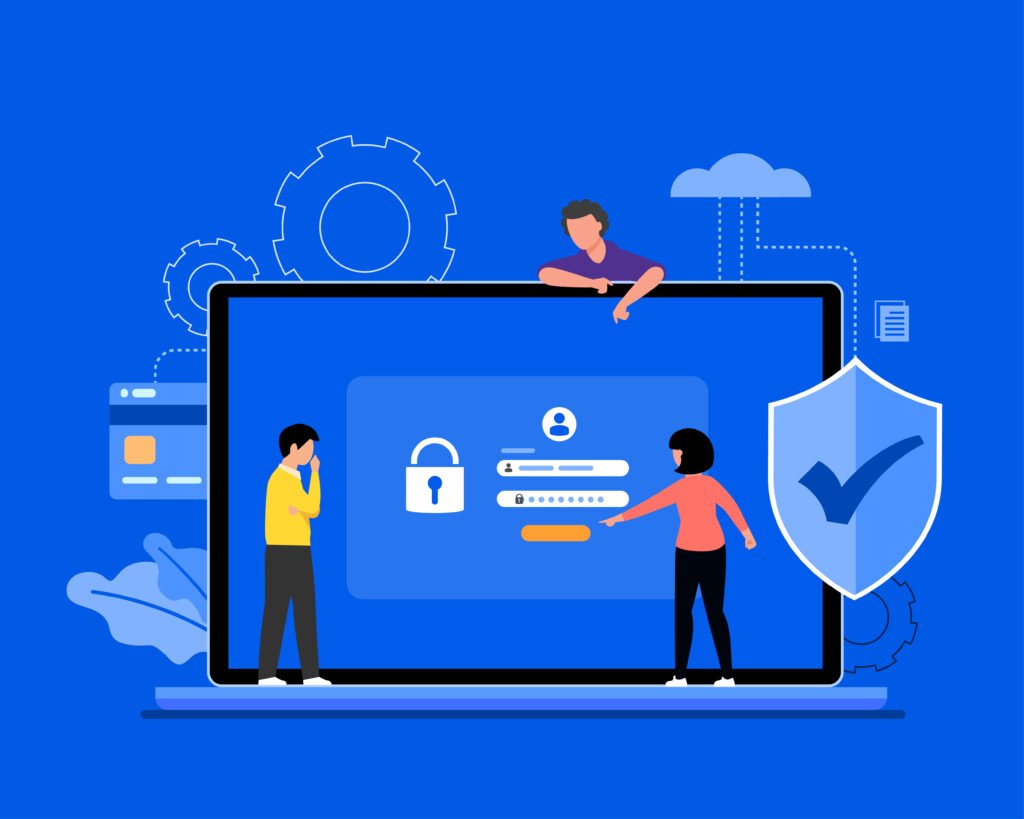How Hackers Break Weak Password: In the modern age of technology passwords are the keys to our online life. Unfortunately many people still rely on weak easily guessable passwords making them vulnerable to attacks. Hackers have become incredibly sophisticated leveraging advanced techniques to crack weak passwords and gain unauthorized access to personal and financial information. But there are effective strategies to keep your data secure. In this article we’ll explore how hackers crack weak passwords and more importantly, how you can protect yourself with simple yet powerful steps like using random generated passwords and leveraging free password generators.

Contents List
Understanding How Hackers Crack Weak Passwords
1. The Importance of Password Security
Strong passwords are the first line of defense against cybercriminals. While they may seem like a hassle to remember or manage, creating robust, unique passwords is crucial for keeping your accounts and data secure. Hackers target weak passwords because they know many users prioritize convenience over security.
2. Common Hacking Techniques for Cracking Weak Passwords
Hackers employ various techniques to break into accounts secured with weak passwords. Knowing how these methods work can help you better understand why a random generated password is so important.
- Brute Force Attacks
In brute force attacks hackers use automated software to guess passwords by trying every possible combination until the correct one is found. Short, simple passwords are quickly cracked with this method. To counter brute force attacks, always generate password random with a mix of characters. - Dictionary Attacks
A dictionary attack involves using a list of common words and phrases, usually based on human habits, to guess passwords. Passwords that are short, use common words, or include predictable sequences (like “password123”) are highly vulnerable. - Social Engineering
Hackers often use social engineering to manipulate people into revealing their passwords. They may pose as someone trustworthy or trick individuals into clicking on malicious links which allows hackers to harvest sensitive information. Using a passwords random generator to create unpredictable, unique passwords helps minimize this risk. - Phishing Attacks
Phishing is a form of social engineering where hackers send fake emails or messages that appear legitimate to trick users into revealing their passwords. Once you fall into this trap, your data can be stolen in minutes. A strong, random password combined with two-factor authentication adds extra layers of security.
Weak Passwords Fail and How to Strengthen Them
1. Characteristics of Weak Passwords
Weak passwords share some common traits, making them easy targets for hackers. They’re usually:
- Short (under 8 characters)
- Based on personal information (birthdays, pet names)
- Simple patterns (like “abcd1234”)
- Reused across multiple accounts
2. The Role of Random Password Generators in Creating Strong Passwords
To secure your accounts, consider using a free password generator like the one available at makemypin.com. Generating random passwords with these tools ensures that your passwords are strong, unique, and unpredictable. These generators can create passwords with complex combinations of letters, numbers, and special characters which make brute force and dictionary attacks much harder to execute.
3. Advantages of Using Random Password Generators
A generator password free solution offers several advantages:
- Unpredictable Combinations: Passwords generated by a random password generator lack the common patterns hackers rely on making them highly secure.
- Time-Saving: It eliminates the need to come up with new passwords yourself.
- Easy Management: Many free password generators like the one on makemypin.com also offer additional tools to save and manage your passwords.
View more posts: Risk of Weak Passwords: How to Create Passwords That Are Safe and Easy to Remember
How to Use Password Generators Effectively

When you create password random using a generator you get the best of both worlds: security and convenience. Here’s a quick guide:
1. Setting Up Strong Passwords with a Generator
- Select Length and Complexity: Choose a password length of at least 12 characters and include a mix of uppercase letters lowercase letters numbers and special characters.
- Avoid Common Phrases or Personal Details: Generators will skip any predictable information, which is crucial for preventing easy guesses.
- Change Passwords Regularly: Set a schedule to update your passwords every few months using your passwords random generator.
2. Managing Your Passwords Safely
Once you’ve used a random password generator to create strong passwords you’ll need a way to manage them without compromising security:
- Use a Password Manager: Password managers securely store and autofill passwords so you don’t need to remember every detail.
- Back Up Your Passwords Securely: Store backup information in a secure physical location or in encrypted digital storage.
Advanced Security Tips to Keep Hackers at Bay
1. Enable Two-Factor Authentication (2FA)
Two-factor authentication (2FA) adds a second layer of security by requiring a second verification method. This might be a code delivered to your mobile device or an authentication app.
Even if a hacker manages to guess your password, they would still need this additional code to access your account.
2. Regularly Monitor Account Activity
Monitoring your account activity helps you spot unusual behavior early on. Regular checks can reveal unauthorized access attempts or suspicious logins. Most platforms provide alerts when there are login attempts from new locations or devices so enable these notifications if they’re available.
3. Don’t use the same password for multiple accounts accounts
Reusing passwords across accounts significantly increases risk. If one account is compromised hackers will try using the same password on other accounts. Using a free password gen tool like makemypin.com allows you to create unique passwords for each account without hassle.
View more posts: Complete Guide: How Can You Delete Instagram Account Easily
Common Myths About Password Security

1. Longer Passwords Are Always Safer
While length can contribute to password strength, complexity is equally important. A password generator that combines both long and complex passwords—available through a generator password free tool—is the ideal approach.
2. Passwords Need to Be Changed Every Month
Changing your passwords frequently is not necessarily beneficial if they’re already strong. The best practice is to change passwords when a data breach occurs or when you suspect unauthorized access. Regular updates through a free password gen tool add layers of protection as needed.
Making Security a Habit: Daily Practices to Keep Your Data Safe
1. Avoid Public Wi-Fi for Sensitive Transactions
Public Wi-Fi is often less secure and can be a gateway for hackers. Avoid using it to access sensitive accounts or make online purchases. If you must use it, consider using a virtual private network (VPN) for added protection.
2. Educate Yourself on Phishing Scams
Phishing scams are common ways hackers steal login credentials. Learn to identify suspicious emails, messages, and links. Look for signs like grammar mistakes unfamiliar senders and urgent requests.
3. Stay Informed About Security Updates and Best Practices
Many platforms regularly update their security features. Staying informed about these updates and adopting best practices for your online safety can significantly reduce your vulnerability to hacking.
Protect Your Digital World with Strong, Random Passwords
Passwords are your first line of defense in the digital world, and using random generated passwords is an essential step toward safeguarding your online life. By understanding the methods hackers use and implementing the right security practices, you can prevent unauthorized access to your accounts. Start by using a free password generator like the one available on makemypin.com to create unique, secure passwords for each of your accounts. Combine strong passwords with other practices like two-factor authentication and regular account monitoring for robust protection. Embrace these steps today to protect yourself from the ever-evolving threats in the digital landscape.
FAQs
1. Why are random passwords more secure than simple passwords?
Random passwords are more complex, making them harder for hackers to guess or crack. They include unpredictable combinations of characters that deter brute force and dictionary attacks.
2. Can a free password generator really help with password security?
Yes a free password gen tool, like the one on makemypin.com, creates highly secure passwords that are difficult to crack even with advanced hacking tools.
3. How often should I change my passwords?
It’s a good idea to change passwords when you suspect any unauthorized access or if there’s a data breach. If you’re using a random generated password changing it every few months is an added layer of security.
4. Is two-factor authentication necessary for every account?
Two-factor authentication is highly recommended for accounts containing sensitive information such as emails banking and social media. It adds another layer of protection reducing the chance of unauthorized access.
5. Are password managers safe to use?
Yes, most password managers use high-level encryption to protect stored passwords. They offer a convenient way to manage multiple passwords especially when using a passwords random generator for secure unique passwords across accounts.

Pingback: Risk of Weak Passwords: How to Create Passwords That Are Safe and Easy to Remember